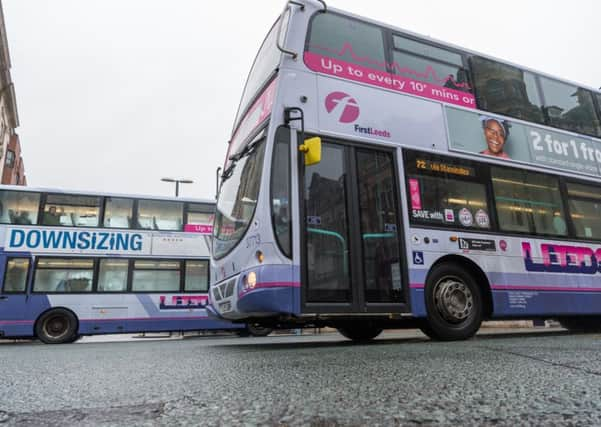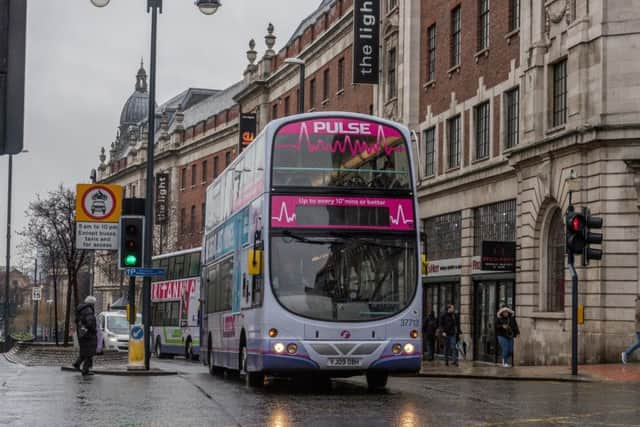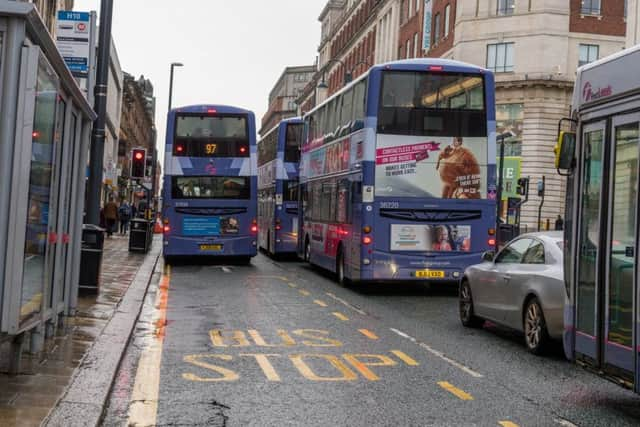End the Wild West on our buses and bring them back into local control – Gareth Lewis


The trade-union movement thinks it is high time to end this Wild West free market in buses, which lets big corporations ride roughshod over honest Yorkshire folk just trying to get around.
So that’s why we’re calling on all candidates in this election to back our campaign to reregulate the buses and support a change in the law to make public ownership of buses legal again.
Advertisement
Hide AdAdvertisement
Hide Ad

But why do we feel so strongly about this? Think about the last time you needed to use a bus. You can’t even get from A to B nowadays without forking out close to a fiver while sitting on a bone shaker that takes you round the houses.
Last week I wanted to travel from one side of Wakefield to the National Coal Mining Museum. I had to use a well-known bus company to get to the centre of town and then had to change on to a different branded bus, but still owned by that same big corporation, and they told me my day ticket wasn’t valid for that particular brand of bus. They got another few quid out of me for that.
Advertisement
Hide AdAdvertisement
Hide AdHow did it come to be like this? Well, since the Thatcher government privatised the bus sector in 1984, bus companies have been able to do whatever they want.


And they’ve decided to run a Wild West free market, competing on the few profitable routes and hacking away with relish at the less-profitable but absolutely vital routes that serve poorer and remote communities.
This dire situation is reflected in passenger numbers. Ridership in the greater Leeds area has plummeted by one-third since privatisation. In South Yorkshire in the same period, there has been a 62 per cent fall in usage.
Advertisement
Hide AdAdvertisement
Hide AdIt’s almost no wonder these poor old private companies aren’t putting buses on if no one is using them. But if that’s the case, then why is bus use in London so much better?
I’m going to let you into a little secret about creating a free market for bus services – it does not work.
In London, the Mayor and Transport for London have powers to regulate or franchise bus services, meaning they get to set the routes, service frequency and price all to suit the needs of users rather than corporate fat cats.
And exactly the opposite is happening right now across Yorkshire. Buses are being run for profit, not people. But why should we bother trying to fix it?
Advertisement
Hide AdAdvertisement
Hide AdBecause working-class people disproportionately rely on buses to get around. A 2014 survey showed that people from the lowest-income households travel on average 2.4 times further by bus than people in households with the highest income level. Women are also affected more. They make more bus trips than men.
Unaffordable or inaccessible bus services are one of the major barriers to accessing job opportunities for residents in low-income neighbourhoods, according to the Joseph Rowntree Foundation.
Their research shows that many people, particularly women, need to work locally due to commitments as primary carers for young children or adults.
This problem is exacerbated by precarious or zero-hours contract work. The Job Centre expects you to travel 90 minutes for a job. But if your bus is hourly and you only find out if your shift is on that day when you arrive at work, then how can you plan your life?
Advertisement
Hide AdAdvertisement
Hide AdBad services, expensive tickets and insecurity of work. These are all reasons why the trade-union movement in Yorkshire is calling on all candidates to back public ownership of our bus networks.
South Yorkshire and West Yorkshire both have the powers under the 2017 Bus Services Act to bring buses back under public control. This would end the Wild West free market in bus services.
It would force private companies to give minimum service frequencies, agree one flat fare for travel and they would have to introduce smart ticketing, meaning you could travel on one of more operator’s services without having to buy a new ticket.
To achieve this change and to campaign to make public ownership legal, you need to call and write to your local candidates to tell them that you care about your bus service – and that you’ve had enough.
Gareth Lewis is policy and campaigns officer for the TUC in Yorkshire and the Humber.